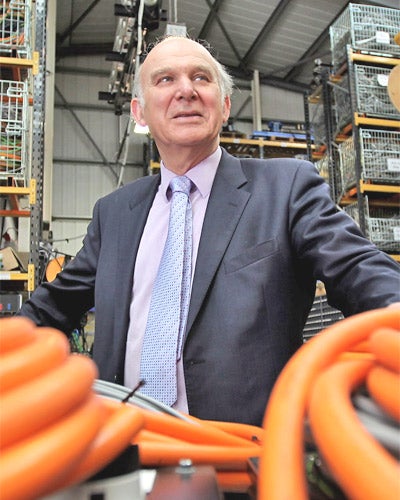Manufacturing and jobs market show growth

The renaissance of British manufacturing industry, albeit after its worst slump in three-quarters of a century, picked up momentum last month, according to the latest official figures.
The Office for National Statistics reported that output in the sector surged by 0.6 per cent in the month to November. On an annualised basis this would represent a startling growth rate of 7.2 per cent.
However, the October data is unlikely to turbocharge the fourth quarter's key GDP data because the rest of industrial production – mining, oil and gas and utilities such as water – fell back. This, in turn, was due to 4.2 per cent drop in North Sea extraction, a volatile item that does not reflect wider economic conditions. Industry, in any case, comprises only about 15 per cent of the economy.
Overall, the City took the 0.2 per cent decline on overall industrial output as positive news.
Fears of a "jobless recovery" and the inability of the private sector to create the jobs needed to mop up redundancies from public spending cuts will also be allayed today with the latest KPMG/Recruitment and Employment Confederation's "Report on Jobs".
The report shows growth of both permanent placements and temporary billings accelerated in November, following a sustained slowdown in growth in recent months. Overall job vacancies were up and pay pressures remained "subdued" last month.
The latest increases in permanent and temporary staff availability were the strongest in eight and 11 months respectively.
Taken together, the data suggests that optimistic survey indicators of hiring intentions and of industrial activity earlier in the year are proving reliable, and that the much-talked about "double dip" is receding as a realistic possibility, though the current crises in the eurozone may have unpredictable consequences. Manufacturing output has shown a year-on-year rise of 5.6 per cent over the past three months – the fastest pace of growth since December 1994.
Exports have been boosted by the sharp depreciation of sterling – down some 25 per cent from its 2007 peaks. It is thus suggestive of the broader rebalancing of the UK economy that ministers and the Bank of England have set as an objective.
Philip Rush, UK economist at Nomura International, said: "Although the service sector has struggled to gain global market share, despite the persistent weakness in sterling, the manufacturing sector has taken advantage of it and is reaping the rewards. We see this as part of the rebalancing of the UK economy towards exports and investment at the expense of the public sector and private consumption."
On jobs, Kevin Green, the chief executive of the REC, is pointing to skills shortages – despite a headline unemployment figure of almost 2.5 million, which perhaps implies that the growth potential and unused capacity in the economy is less than estimated by the Bank and others.
"Confidence among private sector employers does seem to be returning," Mr Green said. "As the jobs market grows, skills and talent shortages are starting to emerge. Our members have identified specific job categories that are already in short supply, including HGV drivers, engineers, IT specialists and chefs."
He also sounded a warning on the Government's immigration cap: "Changes to immigration policy could exacerbate these shortages in the short-term, so we need to build pipelines into growth sectors through better support and guidance to job-seekers and a targeted skills agenda."
Economy returning to normal – but very slowly
* Britain's oldest established economic think-tank, the National Institute of Economic and Social Research (Niesr), has estimated a slight acceleration in the rate of growth of the economy asa whole.
The Niesr says that growth in three months to November was 0.6 per cent, against 0.5 per cent in the three months to October. This means, says the National Institute, that the case for further quantitative easing by the Bank of England is weakened, as a result of the apparent pick-up in activity.
* The Bank of England's interest rate-setting Monetary Policy Committee starts its deliberations today and will announce its decision at noon tomorrow. Few observers expect the Bank to alter the base rate from 0.5 per cent and they expect the Bank to keep its current stance on quantitative easing, the direct injection of money into economy, on hold.
However, the lively three-way split between those on the rate-setting committee who want tighten, loosen and keep policy unchanged is expected to intensify this month.
* The National Institute predicts that the economy will not return to the peak levels of output last seen in 2008 until 2012. On the National Institute's definitions, the UK economy is out of recession – since output is no longer falling or receding – but it is still in depression, which the think-tank regards as the period until output regains its past peak.
Subscribe to Independent Premium to bookmark this article
Want to bookmark your favourite articles and stories to read or reference later? Start your Independent Premium subscription today.

Join our commenting forum
Join thought-provoking conversations, follow other Independent readers and see their replies